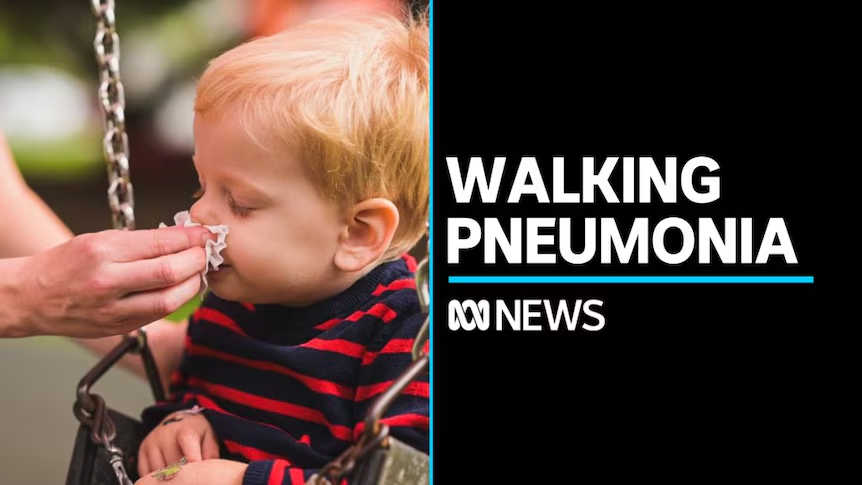Introduction
As the seasons change, so do the temperatures. This means coughs and colds in kids are much more common. But when you or your child is coughing a lot for an extended period, it might be something more than just a cold. According to the Centres for Disease Control and Prevention, mycoplasma pneumonia is on the rise, particularly in young children throughout the United States. This is a respiratory disease easily treatable but not so simple to diagnose because its widespread symptoms often mimic other cases of respiratory infection.
What is Mycoplasma pneumonia?
Mycoplasma pneumonia is due to Mycoplasma pneumoniae, an infection that produces a form of pneumonia called “walking pneumonia.” The term “walking pneumonia” refers to the often mild symptoms that a child or adult may not even recognize as pneumonia, allowing them to go about their day normally. However, a health care professional must treat the illness to fully alleviate its discomfort.
Watch for these signs:
She informs Medscape Medical News that an early presentation of this condition typically involves symptoms similar to those of a common cold. Nasal discharge Sore throat Low-grade fever Sneezing General fatigue: loss of appetite
The hallmark symptom of mycoplasma pneumonia is a persistent, deep, disruptive cough. For many children, the cough persists for weeks, meaning they cannot sleep, cannot study in school, and cannot act like themselves.
Why Cases Are Rising
According to the CDC, mycoplasma pneumonia is said to be at a raised rate in the United States, all across it. The report also noted that the increase in cases began in the spring, coinciding with the start of school sessions after the fall season. Various reasons result in this condition:
Greater interaction: Students at schools interact with each other in greater numbers, which increases the likelihood of bacterial infection among the aforementioned school-going children.
Varying immunity: Years ago, children were not exposed to common infectious diseases due to the COVID-19 outbreak. It may lack immunity to certain bacterial infections.
Season: With change in weather becoming cold, it increases the child’s sitting hours indoors, which is likely to increase the risk of catching an infection.
How is Mycoplasma pneumonia spread?
It spreads mainly through respiratory droplets when the carrier coughs or sneezes. It is not as contagious as influenza, but it does spread in institutions, in schools, daycare centres, and among family members in close contact.

Identifying the cough
A cough in mycoplasma pneumonia is unique in that it persists. While the initial symptoms may feel like a common cold, this cough can become deeper over time, often without the accompanying high fever that is experienced with other pneumonias.
Here are some signs that the cough may be due to mycoplasma pneumonia rather than a viral cold:
Duration: It lasts for more than a week and doesn’t respond to over-the-counter cough medicines.
Intensity: The cough is deep, almost barking, and bothers him at night.
Frequency: It is frequent during the day and occurs when he lies down or exerts himself.
Diagnosis and Treatment
If you suspect your child’s cough is more than just a common cold, then a pediatrician would be the best doctor to consult. They will check on the child’s body and listen for crackling sounds in the lungs. Sometimes, they will take a chest X-ray to determine if pneumonia is indeed present. In some instances, they may even do a blood test or a throat swab to find out if Mycoplasma pneumoniae is the cause.
The good news is that mycoplasma pneumonia responds very well to antibiotics, and this is usually a member of the macrolide family, such as azithromycin. While the viral infections do not respond to antibiotics, mycoplasma pneumonia does. However, because of its mild symptoms, some children may recover on their own without antibiotics. See a healthcare provider to know the best course of action.
Home Care Guidance for Mycoplasma Pneumonia
While antibiotics would definitely assist in regulating the bacterial infection, there are home care techniques for maintaining comfort of children.
Below are some practical home care techniques:
Humidifier: Position a humidifier in your child’s bedroom so that it continues to have air moist, which could relieve an irritative, constant cough.
Rest and Fluids: Ensure your child is properly rested and also on the right intake of fluids, which should continue to help keep your child hydrated thus boosting the immunity system.
Over-the-Counter Medication: At times, over-the-counter medications may be given for some symptoms like fever or sore throat. First and foremost, consult with your pediatrician before administering any medication to your child.
Isolation: Mycoplasma pneumonia is highly contagious, so make sure your child stays at home until they are no longer contagious, which typically happens a few days after antibiotic intake.
Prevention of Mycoplasma Pneumonia
There is no vaccine for the causative organism mycoplasma pneumonia, but you can reduce the risk of contracting it by:
Practice Good Hygiene: Encourage frequent handwashing, especially after coughing or sneezing.
Avoid Close Contact: Avoid exposing your child to others who are sick and remind them to cover their cough or sneeze.
Healthy Environment: Keep your home’s air quality in check by using air purifiers, cleaning regularly, and avoiding smoking indoors.
Vaccinate Against Other Respiratory Illnesses: Make sure your child’s vaccinations are current on the flu and other respiratory illnesses to prevent complications.
When to Seek Emergency Care
Most of the time, mycoplasma pneumonia can be treated at home, but sometimes, it is necessary to seek emergency care:
Difficulty Breathing: If your child is having trouble breathing or their chest is retracting with each breath, seek medical attention immediately.
High Fever: A fever over 102°F (39°C) that does not improve with fever reducers may indicate a more serious infection.
Severe Fatigue or Lethargy: If your child is extremely tired or unresponsive, have them evaluated immediately.

Conclusion
Mycoplasma pneumonia is on the rise, so it is imperative to be informed about symptoms and when a lingering cough might be more than just a cold. Mycoplasma pneumonia is curable, especially if it’s diagnosed early. Knowing how to manage symptoms at home can make a big difference in helping your child feel better sooner. Parents can protect their kids and keep their families healthy by following preventive measures and knowing when to seek medical attention.




